On 3-5 November, the 6th CASSINI Hackathon took place simultaneously in 11 locations across Europe. Garage48 proudly represented the Baltics with a local hub in Tallinn by hosting 50 participants who formed 9 strong teams. The hackathon was followed by an International Demo Day on 9 November where the Estonian representatives took home second place!
The CASSINI hackathons aim to find innovative ways to use EU Space Data across a variety of different topic areas. This 6th edition focused on humanitarian aid and international development. More specifically, teams worked on solutions related to sustainable infrastructure development, food security, access to clean water, and forced migration.
In 2023, one in every 23 people worldwide needs humanitarian relief. This is more than double the percentage of the global population in need compared to four years ago. Among other challenges, the climate crisis, conflicts, epidemics and a slowdown of the economy have caused record levels of hunger, poverty and inequality (OCHA).
There is an immense amount of space data available through European satellites that could be used to find solutions to some of these vital challenges. This edition of the hackathon encouraged participants to make the most of the information available in the Copernicus, Galileo and Egnos databases and utilize it in innovative ways. We were amazed at the variety of ideas that the teams came up with! In the Estonian local hackathon alone, we saw the data used for everything from identifying potential rat infestations in harvest areas to detecting mineral repositories to predicting migration.
A pre-event inspired participants and helped shape ideas
To support idea generation and facilitate networking before the busy hackathon weekend, an official pre-event took place on October 31 as part of the Software Defined Space Conference. Karin Maasel from Data Friendly Space and Julia Gerda Sokk from Mondo inspired participants with real-life examples of solutions to similar challenges that the teams would be tackling at the hackathon. Idea owners had the opportunity to validate their ideas with mentors and field experts. The event proved valuable to the participants who attended and many ideas were iterated based on feedback.
Karin Maasel sharing her experience at the pre-event
A weekend packed with space data
The CASSINI hackathon kicked off on Friday evening with welcoming words from the central hub who was managing all 10 locations. After this, idea owners pitched their ideas at our local kickoff and team formation was underway! 13 ideas were pitched and ultimately, 9 teams were formed. Out of these, we had 6 onsite teams and 3 virtual teams, which was a great ratio for a hybrid hackathon.
The next two days were packed with data analysis, iteration, programming, business development, mentoring, and lots of hard work. Despite many challenges trying to work through countless data sets to find trends and trying to download massive files, all of the teams managed to finish their prototypes in time for the finals.
It was a great weekend with amazing, hands-on participants and mentors. It was nice to see how two worlds came together, the humanitarian and space tech fields, and through teamwork they could foster solutions that contribute to the well-being of people in need.
- Kadi Aguraijuja, Garage48 Project Manager
FoodSafe, the overall winner moved on to an international demo day, where they pitched their solution alongside all 9 other local hackathon winners. They placed second and won 100 hours of additional mentoring from CASSINI experts to help them bring their ideas to life. What an achievement!
Additionally, we awarded prizes from our community partners CleanTech Estonia, ESA BIC, sTARTUp Day, RTU Science and Innovation Center and Tech Zity to outstanding teams who took part in the hackathon.
A huge thank you to all of the mentors who supported the teams and ensured they got to the finish line: David Clark, Andres Luhamaa, Ilya Bolkhovsky, Karin Maasel, Calum Cameron, Villem Nilbe, Romet Tagobert, Fariha Harun, Kristiina Lillestik, Berk Erdem, Indrek Kelder, and Marius Taparavičius.
Meet the teams:
OVERALL WINNER: FoodSafe
A third of food produced is wasted globally. In areas that are food insecure, this is mostly due to storage issues which can cause the crops to be contaminated by mold or destroyed by rats.
FoodSafe uses satellite data to calculate the probability of food storage issues (such as flooding, mould, rats, etc.) globally. When a threat is identified, a warning is sent to stakeholders encouraging them to consume or sell their crops in a timely manner.
The team won 100 hours of mentoring from CASSINI experts.
Team members: Aliine, Britta Pung, Viktor Brešan, Katrin Meschin, Ilkin Mazak, Misha Zujev and Ileska.
Read more about FoodSafe’s solution here.
FIRST RUNNER UP: MPC
Millions of people are involuntarily displaced every year for a variety of reasons such as economy, geopolitics, or a changing environment and climate change. Current migration prediction models aren’t precise, but as more and more people are forced to migrate for a variety of reasons, it’s imperative to develop a better understanding of migration to predict future trends.
MCP built a solution that leverages the Copernicus Data Space Ecosystem as well as data from EUROSTAT, World Bank, The Humanitarian Data Exchange, and other climate resources to develop a working model that can predict human movement even in peaceful times.
The team won 10 hours of additional mentoring from Indrek Kelder, the co-founder of CleanTech Estonia, an invitation to the CleanTech Estonia community event, and tickets to sTARTUp Day 2024.
Participating in the Cassini Hackathon was a remarkable journey for our team at MPC. Tackling the challenge of predicting forced migration using Copernicus environmental data was both exhilarating and enlightening. Working under pressure, we combined our skills in data analysis and humanitarian aid to create a solution that not only anticipates migration trends but also prepares for them. The hackathon environment fostered creativity and collaboration, inspiring us to push our boundaries. We're eager to return, armed with new ideas and an even greater drive to innovate for social good. If people take part, put yourself up for a challenge, I´m sure you will enjoy the ride!
- Madis Kask, MPC team lead
Team members: Madis Kask, Jürgen Hintsov, Hans Urm, Riho Välli, Fred Elhi, Martin Kask, Kätlin Teern, and Maria Kesa.
Read more about MPC here.
SECOND RUNNER UP: C-Conflict
In areas with active conflict, access to safe areas is extremely important. As the state of infrastructure and roads can change fast, it’s not always reliable to wait for instructions from news or humanitarian agencies to plan evacuation routes.
C-Conflict visualizes urban destruction and signs of warfare on a web-based map. Their platform uses satellite data to help plan accessible routes in acute crisis settings. As a next step, they plan to apply additional satellite information to enable more up-to-date info.
The team won 2000€ worth of additional mentoring from ESA BIC.
The CASSINI hackathon organized by Garage48 has been a hack to meet enthusiastic people from diverse fields. C-Conflict was formed on site and we have expertise from migration to software engineering to business development. If you want to meet your future business partners go to Garage48.org and register for your next/first hackathon.
- Domenik, C-Conflict team lead
Team members: Domenik, Jens Jäger, Kevin Kliimask, Meelis Niine, Priit Kaard, Lauri Sarap.
Read more about C-Conflict here.
SPECIAL MENTION: Critical Spot
Critical minerals such as gold and copper tend to be expensive and time-consuming to detect. In addition, mining itself is inherently unsustainable due to the irreversible effect on the landscape, greenhouse gas emissions, and erosion of land. This is especially devastating if the mining activities take place in a place where there aren’t any minerals to begin with.
Critical Spot’s solution uses satellite data to accurately predict mineral deposits, which substantially cuts down the time, cost and environmental impact of mineral detection.
The team won an invitation to the CleanTech Estonia community event.
Team members: Kristjan Roosild, Arnel Pällo, Moustapha Ebnou, Mehdi Boubnan, and Bouya.
Read more about Critical Spot here.
SPECIAL MENTION: Change Trace
Noncompliance with building regulations and lack of early regulatory checks can create security hazards and destroy natural heritage. Although some cases are known, many still go under the radar. This can affect the safety and well-being of communities on a large scale.
ChangeTrace utilizes open remote sensing data and modern technologies to create a warning system for flagging potential cases of illicit construction work. They already have interest from Riga City and plan to expand the project to other cities across the world.
We are grateful to the Garage48 and CASSINI Hackathon organizers for a memorable first hackathon experience. We appreciate the space we had to develop our idea, connect with people, and receive feedback. It was a strong start for us and we plan to develop our idea further.
- Anton, Change Trace team lead
Team members: Anton Kostiukhin, Raúl García Estévez, Janis Jemeljanovs, Anita Rozenvalde, Ayisha, and Marta.
Read more about ChangeTrace here.
FarmAId
Unpredictable weather, degrading soil, and lack of access to modern farming techniques make it difficult for farmers to make decisions about what crops are best suited for their land and when the best time to harvest their yields is. Climate change is making the problem worse as it makes traditional farming methods less effective.
FarmAId uses satellite data and AI to provide personalized advice for farmers. The AI analyzes land characteristics and changing weather patterns to recommend crops that will thrive in any specific area.
Team members: Andriy Tymchenko, Liina Freivald, Karl Matti, Chigozie Nkwocha, Abdullah Bazarov, and Jaan.
Read more about FarmAId here.
Gratheon
Bees are key to natural pollination, which increases crop yields and aids in food supply. Unfortunately, most beekeepers don’t know where they should place their hives and when they position them randomly, they aren’t very effective in aiding the pollination of farming crops.
Gratheon analyzes pollination coverage from satellites to help position beehives more efficiently. As a result, farmers get better yields, beekeepers get more honey and healthier bees, and bees get more nectar or more diverse pollen.
Team members: Artjom Kurapov, Reinis Indāns, Nataliia Kinash, and Aleksei Boris.
Read more about Gratheon here.
Save the Fruits!
Mango, avocado and banana trees are plagued by insects, which can collapse production due to overpopulation. Climate change and product transportation are quickly making this a global problem.
Save the Fruits! is working on a solution to identify the possible living conditions of the insects and diseases that plague fruit production in order to provide better care for the plants. In addition, their app provides educational resources for farmers about recommended pesticides and when to prune their plants.
Team members: Mörður Moli Gott, Anni, and Toompa.
Read more about Save the Fruits! here.
GeoAgTech
A green city is beneficial from many standpoints. In addition to making the city environment more pleasant to spend time in and look at, plants provide clean air, cool pavements during heatwaves, absorb noise, and make it safer to cycle or walk around the city.
GeoAgTech built a solution that helps city planners and urban landscapers make more informed decisions about what areas need more greenspaces. To do so, they identify heat sinks, rainwater collection sites, and other urban characteristics.
Team members: Jana Lumi, Laury, Eimantas Kiseliovas, and Juho.
Read more about GeoAgTech here.
If you want to see more of the 6th CASSINI Hackathon:
👉🏻 Check out the whole photo album.
👉🏻 Rewatch the opening and the finals.
Huge thank you to all of the organizations who supported the hackathon:
Estonian Space Office, Republic of Estonia Environment Agency, ESA BIC Estonia, Latvian Space Industry Association, Estonian Red Cross, CleanTech Estonia, Tartu Observatory, Mondo, Tartu Science Park, Tech Zity, Riga Technical University, Software Defined Space Conference, Estonian Refugee Council, Estonian Research Council, and the Estonian International Development Round Table.
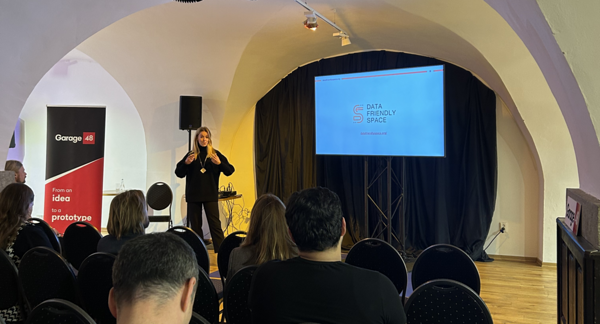
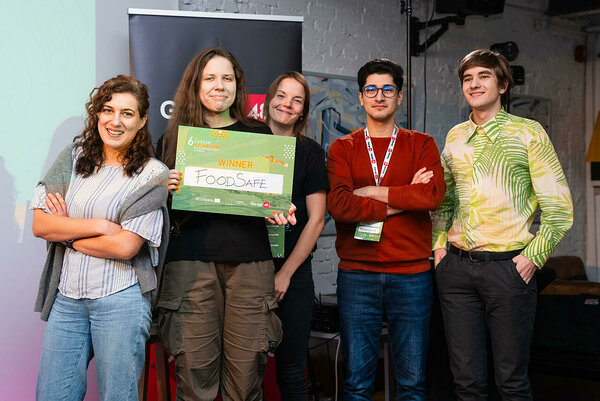
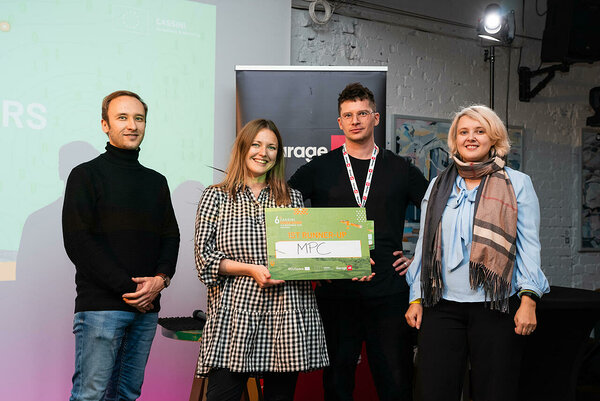
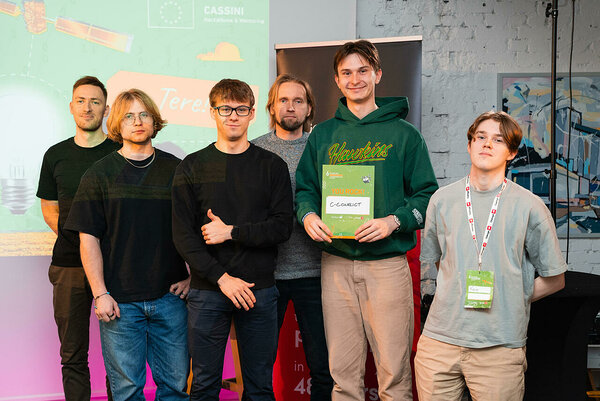
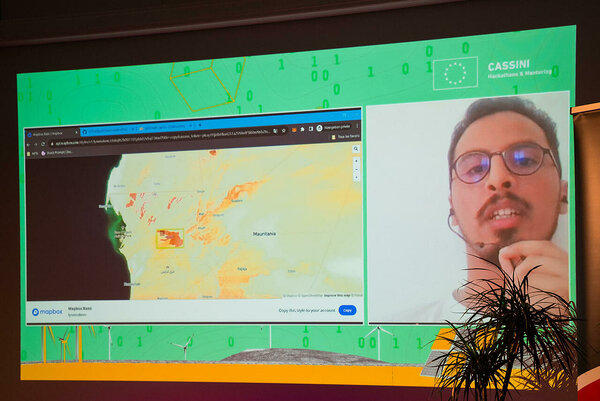
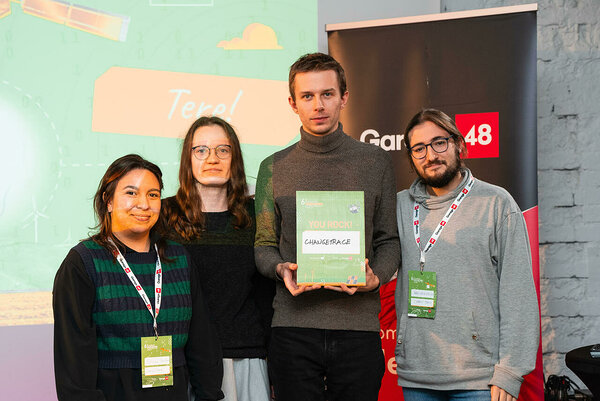
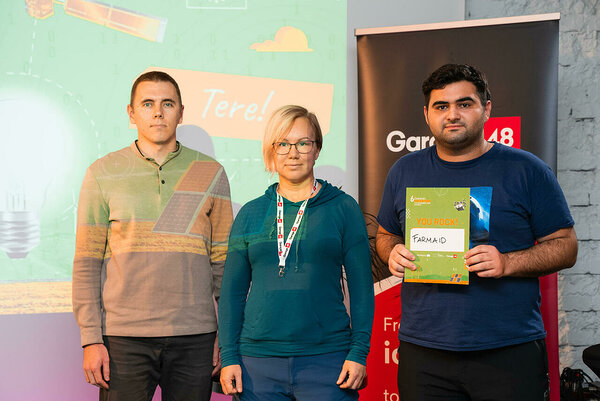
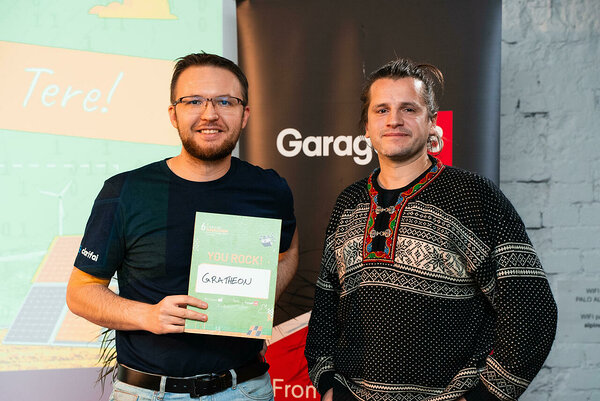
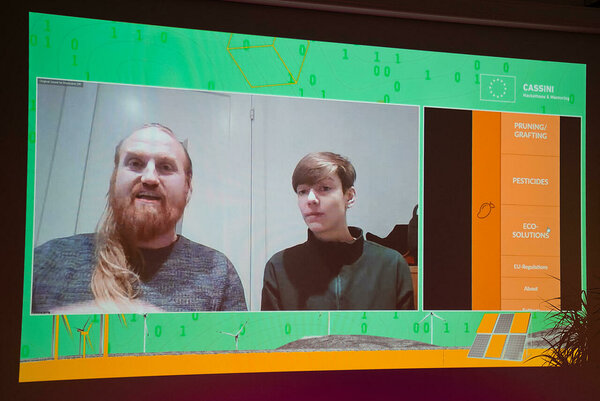
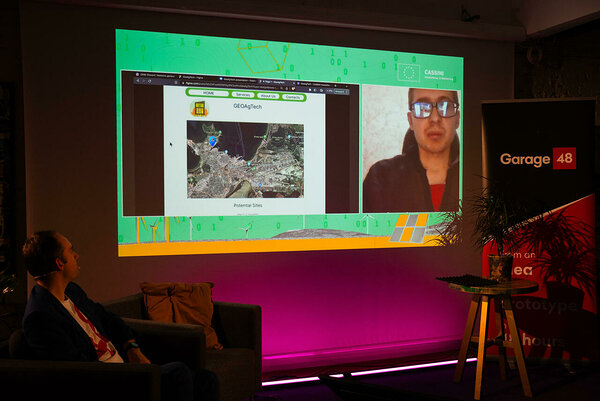
_block.png)